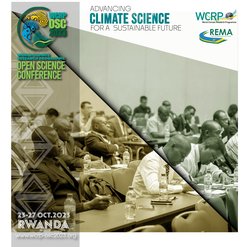WCRP Open Science Conference
- Start: Oct 22, 2023
- End: Oct 26, 2023
- Location: Kigali, Rwanda
- Host: Markus Reichstein, Vitus Benson, Dorothea Frank,
- Contact: Risk-kan-jena-team@lists.gwdg.de

Townhall 01: Artificial Intelligence for climate risk mitigation: navigating opportunities and challenges
Conveners: Vitus Benson and Markus Reichstein - Max-Planck-Institute for Biogeochemistry, Germany
Description: This side event will explore the potential of Artificial Intelligence (AI) in mitigating climate risks and associated impacts. Topics to be discussed include the use of machine learning for early warning signals and forecast-based finance triggers, bridging weather and impact forecasts with AI, AI in socio-ecological systems, combining social media and geoscientific data, and the accountability and fairness of AI methods. Concrete success stories and failures of anticipatory action and capacity building will be discussed. The goal is to bring together experts from diverse backgrounds to exchange ideas, identify common ground, and work towards a shared objective in using AI for climate risk mitigation.
Name of organizing project/institution: Knowledge Action Network on Emergent Risks and Extreme Events (RISK-KAN) (www.risk-kan.org), and the ELLIS Unit Jena (www.ellis-jena.ai) within the ELLIS network (www.ellis.eu).
Poster Session 31: Climate extremes & risk: Impacts, cascades, feedbacks with biosphere and society
Conveners: Markus Reichstein, Max-Planck-Institute for Biogeochemistry, RISK-KAN and Jana Sillmann, University of Hamburg
Description: Extreme climate and weather events, associated disasters and emergent risks are becoming increasingly critical in the context of global environmental change and interact with other stressors. They are a potential major threat to reaching the Sustainable Development Goals (SDGs) and one of the most pressing challenges for future human well-being. This session explores the linkages between extreme climate and weather events, associated disasters, societal dynamics and resilience. Emphasis is laid on
- Which impacts are caused by extreme climate events (including risks emerging from compound events) and cascades of impacts on various aspects of ecosystems and societies?
- Which feedbacks across ecosystems, infrastructures and societies exist?
- What are key obstacles towards societal resilience and reaching the SDGs, while facing climate extremes?
- What can we learn from past experiences?
- What local to global governance arrangements best support equitable and sustainable risk reduction? We welcome empirical, theoretical and modelling studies from local to global scale from the fields of natural sciences, social sciences, humanities and related disciplines.
Session 13: Carbon cycle
Convenors: Galen McKinley - Columbia University, USA; Pedro Monteiro - Stellenbosch University, South Africa; Ana Bastos - Max-Planck-Institut für Biogeochemie, Germany.
Session description : Advances in understanding of the land and ocean carbon cycle perturbation over the historical period and into the 21st century and beyond.
Keynote speakers:
- Pep Candell - CSIRO, Australia ;
- Precious Mongwe - CSIR, South Africa ;
- Junjie Liu - NASA JPL, USA ;
- Kirsten Zickfeld - Simon Fraser University, Canada.
